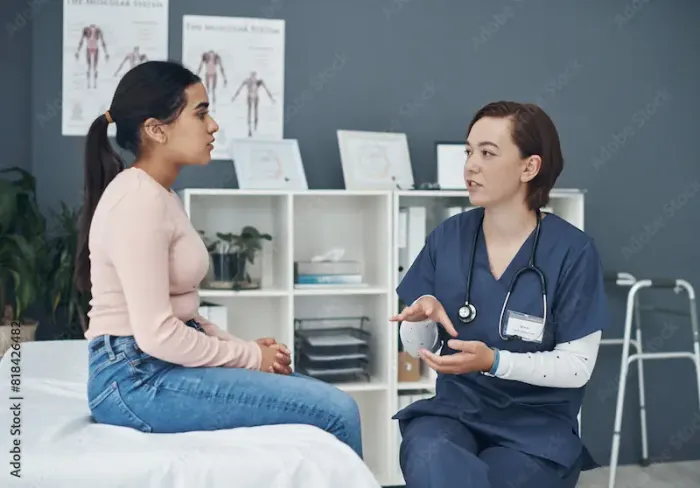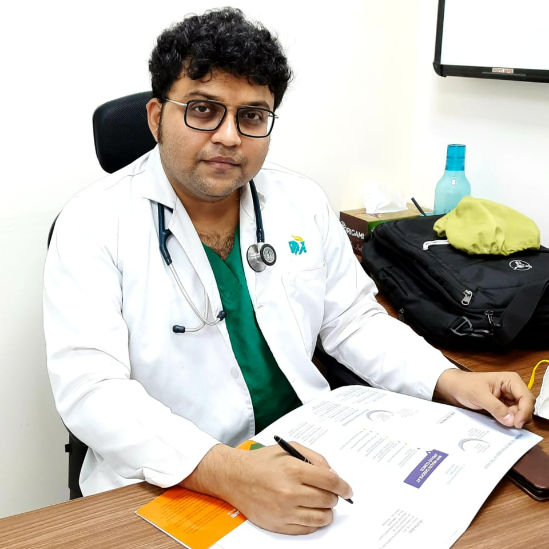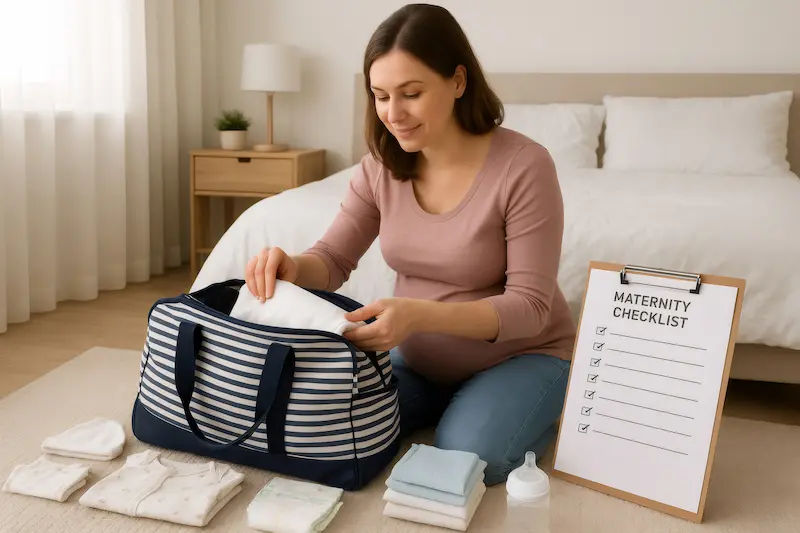Your Complete Guide to Reproductive Health and Wellness
Discover your complete guide to reproductive health and wellness. Learn essential tips for men and women, sexual health, lifestyle choices, contraception, and when to see a doctor.

Written by Dr. Mohammed Kamran
Reviewed by Dr. Dhankecha Mayank Dineshbhai MBBS
Last updated on 13th Jan, 2026

Introduction
Reproductive health is a vital part of your overall well-being, yet it's often shrouded in silence or misconception. It’s not just about avoiding disease or planning for pregnancy; it’s about understanding and caring for your body throughout every stage of life. A healthy reproductive system is fundamental to your physical health, emotional balance, and relationships. This comprehensive guide will demystify reproductive health, offering practical, evidence-based tips for everyone. We’ll explore essential care for men and women, break down the pillars of sexual wellness, and discuss how daily lifestyle choices profoundly impact your hormonal and reproductive function. Whether you're seeking to understand your body better, plan for the future, or address a specific concern, this guide is your first step towards empowered, proactive health. Let's prioritise your reproductive wellness together.
What is Reproductive Health? More Than Just Sex
When people hear "reproductive health," they often think only of sex, pregnancy, or STIs. However, the World Health Organization (WHO) defines it much more broadly as a state of complete physical, mental, and social well-being in all matters relating to the reproductive system. This means it encompasses everything from the comfort of your menstrual cycle and the confidence of a healthy sexual life to the ability to choose if and when to have children.
The WHO Definition and Its Importance
The WHO's definition implies that reproductive health is a human right. It includes:
• The capability to reproduce and the freedom to decide if, when, and how often to do so.
• The right to access appropriate healthcare services for safe pregnancy and childbirth.
• The ability to have a satisfying and safe sex life.
This holistic view underscores that reproductive health is integral to your quality of life and requires attention long before and long after the child-bearing years.
Why Reproductive Health is Crucial for Everyone
Neglecting reproductive health can lead to a host of issues, including infertility, chronic pain, cancers, and the spread of STIs. For example, the CDC reports that STIs have reached record highs in many countries, with many cases going undiagnosed and leading to serious long-term complications like pelvic inflammatory disease. Proactive care, including regular check-ups and open conversations, is the best defence.
Essential Reproductive Health Tips for Women
Women's reproductive health involves a complex interplay of hormones and organs. Understanding your body's rhythms and signals is the first step to maintaining health.
Understanding Your Menstrual Cycle
Your period is a vital sign. Tracking your cycle—noting the start and end dates, flow intensity, and symptoms like cramps or mood changes—can provide invaluable insights. A regular cycle (typically 21-35 days) is often a sign of hormonal balance. Significant irregularities, excessively painful periods, or bleeding between cycles could indicate conditions like PCOS or endometriosis and should be discussed with a gynaecologist.
Key Screenings and Check-ups
Preventive care is non-negotiable. Key screenings include:
• Pap Smear: To test for cervical cancer, recommended every 3 years starting at age 21.
• HPV Test: Often done with a Pap smear for women over 30.
• Pelvic Exam: A physical examination of the reproductive organs.
• Breast Exam: Clinical exams and mammograms (typically starting at age 40-50) are crucial for early detection of breast cancer.
If you experience unusual symptoms like persistent pelvic pain or abnormal bleeding, consult a doctor online with Apollo24|7 for further evaluation.
Managing Common Conditions
Polycystic Ovary Syndrome (PCOS) and endometriosis affect millions of women, often causing pain and impacting fertility. While there is no cure, symptoms can be managed through lifestyle changes, medication, and sometimes surgery. Early diagnosis is key to effective management.
Consult a Specialist for the best advice
Essential Reproductive Health Tips for Men
Men's reproductive health is equally important but frequently overlooked due to stigma. Regular self-care and professional check-ups are essential.
The Importance of Regular Self-Exams and Doctor Visits
Men should perform monthly testicular self-exams to check for lumps, swelling, or pain, which can be early signs of testicular cancer. Additionally, annual physicals should include discussions about sexual health. For men over 50 (or 45 for those with a family history), a discussion about prostate health and the potential need for a PSA test is critical.
Understanding Testicular and Prostate Health
Testicular cancer is one of the most common cancers in young men but is highly treatable when caught early. Prostate issues, including benign prostatic hyperplasia (BPH) and prostate cancer, are common with age. Maintaining a healthy weight and diet can support prostate health.
Foundations of Sexual Health for All
Sexual health is a cornerstone of reproductive wellness, centred on respect, safety, and consent.
Safe Sex Practices and STI Prevention
Consistent and correct use of condoms is the most effective way to prevent the transmission of STIs. Regular STI testing is a responsible part of sexual health, especially with new or multiple partners. Many STIs are asymptomatic, so testing is the only way to know your status. Apollo24|7 offers convenient home collection for tests like HIV, HPV, and full STI panels, providing privacy and ease.
The Importance of Open Communication
Honest communication with your partner(s) about sexual history, boundaries, and contraception is fundamental. It builds trust, ensures mutual consent, and empowers both individuals to make informed decisions about their health.
Nutrition and Lifestyle: Fuelling Your Reproductive System
You truly are what you eat, especially when it comes to hormonal balance.
Foods that Boost Reproductive Wellness
A balanced diet rich in antioxidants, healthy fats, and fibre supports reproductive function.
• For Hormonal Balance: Incorporate omega-3s (fatty fish, flaxseeds), cruciferous vegetables (broccoli, kale), and whole grains.
• For Fertility: Foods rich in zinc (pumpkin seeds, lentils) and folate (leafy greens, citrus) are beneficial for both men and women.
• Limit: Processed foods, excess sugar, and trans fats, which can contribute to inflammation and hormonal disruption.
The Impact of Stress, Sleep, and Exercise
Chronic stress elevates cortisol levels, which can disrupt menstrual cycles and lower sperm count. Prioritising 7-9 hours of quality sleep and engaging in regular, moderate exercise (like brisk walking or yoga) are powerful tools for regulating hormones and improving overall reproductive wellness.
Family Planning and Contraception Choices
Having the ability to plan if and when you have children is a key aspect of reproductive health.
Overview of Reversible and Permanent Methods
There are numerous options available, from short-acting methods like condoms and birth control pills to long-acting reversible contraceptives (LARCs) like IUDs and implants, which are over 99% effective. Permanent options include tubal ligation for women and vasectomy for men.
How to Choose the Right Contraception for You
The "best" method depends on your health, lifestyle, and future family goals. Factors to consider include effectiveness, ease of use, side effects, and STI protection. A consultation with a healthcare provider is essential to make an informed choice. You can discuss these options with a specialist by booking a physical visit to a doctor with Apollo24|7.
When to See a Doctor?
Be proactive and seek medical advice if you experience any of the following:
• For Everyone: Painful urination, sores or bumps in the genital area, unusual discharge, or pain during sex.
• For Women: Periods that are extremely heavy, last longer than 7 days, or are absent for 90 days; severe pelvic pain.
• For Men: A lump or pain in either testicle, changes in sexual desire, or erectile dysfunction.
If your condition does not improve after trying self-care methods, consult a doctor online with Apollo24|7 for further evaluation.
Conclusion
Taking charge of your reproductive health is one of the most empowering things you can do for your long-term well-being. It’s a continuous process of education, self-awareness, and proactive care. By understanding your body, prioritising preventive screenings, adopting a healthy lifestyle, and maintaining open communication, you lay the foundation for a healthier, more confident life. Remember, there is no shame in seeking information or help. Your reproductive health is a key piece of your overall health puzzle—worthy of attention, respect, and care. Start today by scheduling that check-up you’ve been putting off or simply by having a more open conversation with your partner. Your future self will thank you.Consult a Specialist for the best advice
Consult a Specialist for the best advice

Dr. Shiv Prakash Singh
Ayurveda Practitioner
19 Years • BAMS
Kolkata
Vedhive Ayurveda College Street, Kolkata

Dr. Anjan Das
Ayurveda Practitioner
8 Years • Ayurvedacharya ( B.A.M.S )
Dumdum
Vedhive Ayurveda Clinic, Dumdum

Dr. Rik Sadhukhan
Ayurveda Practitioner
8 Years • BAMS
Kolkata
Vedhive Ayurveda, Ballygunge, Kolkata

Dr Madhu R
Dermatologist
5 Years • MBBS, MD, DNB (Dermatology), STD specialist, Cosmetologist, Dermatosurgeon
Bengaluru
Apollo Medical Center, Marathahalli, Bengaluru

Dr. Utsa Basu
Diabetologist
14 Years • MBBS, MD
Kolkata
Dr Utsa Basu Clinic, Kolkata
(400+ Patients)
Consult a Specialist for the best advice

Dr. Shiv Prakash Singh
Ayurveda Practitioner
19 Years • BAMS
Kolkata
Vedhive Ayurveda College Street, Kolkata

Dr. Anjan Das
Ayurveda Practitioner
8 Years • Ayurvedacharya ( B.A.M.S )
Dumdum
Vedhive Ayurveda Clinic, Dumdum

Dr. Rik Sadhukhan
Ayurveda Practitioner
8 Years • BAMS
Kolkata
Vedhive Ayurveda, Ballygunge, Kolkata

Dr Madhu R
Dermatologist
5 Years • MBBS, MD, DNB (Dermatology), STD specialist, Cosmetologist, Dermatosurgeon
Bengaluru
Apollo Medical Center, Marathahalli, Bengaluru

Dr. Utsa Basu
Diabetologist
14 Years • MBBS, MD
Kolkata
Dr Utsa Basu Clinic, Kolkata
(400+ Patients)
More articles from pregnancy
Frequently Asked Questions
1. What are the first signs of a reproductive health issue?
Early signs can be subtle and vary greatly. For women, it could be significant changes in your menstrual cycle or unusual pain. For men, it could be a testicular lump or changes in sexual function. Any persistent, unusual symptom is worth discussing with a doctor.
2. How often should I get tested for STIs?
The frequency depends on your sexual activity. It's generally recommended for sexually active individuals to get tested at least once a year. If you have new or multiple partners, more frequent testing (e.g., every 3-6 months) is advisable.
3. Can lifestyle changes really improve fertility?
Absolutely. For both men and women, factors like maintaining a healthy weight, eating a nutrient-rich diet, managing stress, and avoiding tobacco and excessive alcohol can significantly improve natural fertility and overall reproductive function.
4. At what age should men start worrying about prostate health?
While prostate cancer is more common in older men, discussions about prostate health should start at age 50 for average-risk men. For those with a family history or of African-Caribbean descent, it's recommended to start this conversation at age 45.
5. Is it normal to have irregular periods?
Some variation is normal, especially in teens and women approaching menopause. However, consistently irregular cycles (consistently shorter than 21 days or longer than 35 days) or the absence of periods can be a sign of an underlying condition like PCOS and should be evaluated by a doctor.


.webp)

